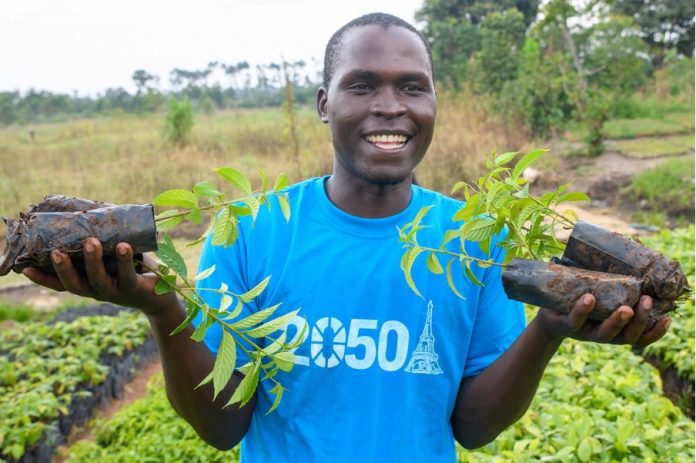In a bid to fortify its commitment to combating climate change, the 2050 Paris Initiative is embarking on a significant expansion of its tree planting initiative in Africa. The project, which began with a vision to mitigate carbon emissions through afforestation, is set to receive renewed momentum with additional funding.
The 2050 Paris Initiative, initially aimed at planting 2.5 billion trees across the African continent by 2050, is extending its efforts thanks to the infusion of new financial support. This expansion underscores the initiative’s dedication to addressing the escalating global climate crisis through tangible actions on the ground.
The project’s core focus remains rooted in reforestation and ecosystem restoration. By planting trees strategically, the initiative aims to counteract deforestation, enhance biodiversity, and bolster local resilience against climate-related challenges. With its inception inspired by the Paris Agreement’s goals, the initiative represents a collective endeavor to limit global temperature rise and mitigate carbon emissions.
The expansion of the initiative is especially poignant in countries such as Uganda, Kenya, Tanzania, and Ghana, where dedicated afforestation programs are being established under the 2050 Paris Initiative. Ugandan individuals, working full-time as part of the initiative, contribute to this expansion by planting trees every day in collaboration with local, regional, and national government bodies. The additional funding will not only amplify these ongoing efforts but also foster collaboration with local communities and governments, promoting sustainable practices and generating positive economic impacts.
The infusion of new funding further emphasizes the importance of private sector engagement in tackling climate change. Leading corporations are contributing their resources and expertise to drive the initiative’s progress, demonstrating the potential of public-private partnerships in advancing environmental goals.
As the 2050 Paris Initiative expands its tree planting initiative in Africa, it sets a precedent for environmental action that extends beyond borders. The initiative’s success resonates not only in the ecological transformation it brings but also in the potential to inspire similar efforts globally.
With each new tree planted, the 2050 Paris Initiative exemplifies the power of collective determination in the face of a changing climate. As the initiative reaches deeper into African landscapes and beyond, it reaffirms its commitment to shaping a more sustainable future for the planet and its inhabitants.
Amid the escalating global climate crisis, the world is witnessing the emergence of the 2050 Paris Initiative. Coordinated by a coalition of European supporters, this project seeks to catalyze carbon reduction efforts by planting trees across the African continent.
With the goal of planting 2.5 billion trees by 2050, the 2050 Paris Initiative aims to reshape Africa’s landscape and contribute significantly to the fight against climate change. This initiative underscores the commitment of the international community to environmental sustainability and emphasizes the urgent need for collective action.
Africa, grappling with the profound impacts of climate change, finds itself at the heart of this initiative. By strategically planting trees across various regions, the project aims to counter deforestation, restore ecosystems, and enhance local resilience in the face of escalating environmental challenges.
The name 2050 Paris Initiative reflects its origin and timeline. Echoing the goals of the Paris Agreement, the programme aims to accelerate efforts to limit global temperature rise and reduce carbon emissions.
The initiative combines advanced technology with collaborative global partnerships. Techniques like drone seeding and satellite monitoring ensure the careful selection of tree species and optimal planting density. Private sector participation, with leading corporations contributing resources and expertise, has been crucial in propelling the initiative forward.
In Uganda, Kenya, Tanzania, and Ghana, local collaborations have enabled the establishment of dedicated afforestation programmes under the 2050 Paris Initiative. These initiatives address regional environmental concerns and stimulate economic growth, empower local communities, and promote biodiversity conservation.
A notable presence in Uganda is David Okello, a dedicated member of the full-time team behind the 2050 Paris Initiative. David, along with his team, plays a pivotal role in planting trees daily, exemplifying the power of consistent effort in contributing to a larger cause. Their collective dedication shapes the success of the initiative in these regions.
Building on these successes, the 2050 Paris Initiative is extending its scope beyond the African continent. Plans are underway to expand afforestation efforts to the Philippines and Indonesia. These countries, with their unique ecosystems and pressing environmental challenges, stand to benefit from the programme’s holistic approach to reforestation and carbon reduction.
While challenges lie ahead, the initiative’s expansion into these regions is met with optimism. Leveraging the lessons learned from African projects, the 2050 Paris Initiative aims to create a blueprint for global environmental collaboration, transcending borders and uniting nations for a shared cause.
As the world grapples with the realities of a changing climate, the 2050 Paris Initiative stands as a testament to innovation and collaboration. It underscores the potential of global partnerships to drive transformative change. As the initiative progresses towards its 2050 goal, it provides evidence of the strength of foresight, determination, and collective action in shaping a more sustainable future for all.







